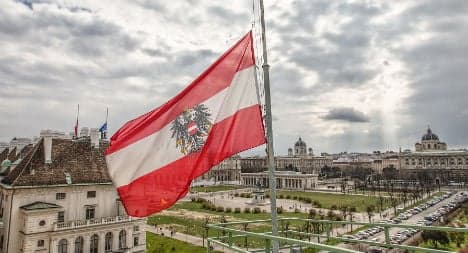Terrorist attack in Austria 'quite likely'

A terrorism expert has said that a terrorist attack in Austria is “quite likely” as the country has become a “secondary target” in recent years.
Nicolas Stockhammer, who is an advisor to government on matters relating to security, said that compared to other countries that Austria is “midfield” in terms of the threat of an attack.
“I consider it quite likely that something will happen in Austria,” said Stockhammer, speaking on the ORF programme ZiB 24 Wednesday night. He added, however, that there is “reason to hope that it will not happen soon.”
His comments come amid tightened security at airports and transport hubs around Europe following the terrorist attacks this week in Brussels that killed at least 31 people.
At Austria’s largest airport - Vienna International Airport - security measures have been strengthened and there is a stronger police presence at the site. All flights to and from the airport and Brussels remain suspended for the time being.
Stockhammer warned that Europe should prepare for at least a 20 year battle against terrorism in which prevention efforts will be key. So far, "too little has been done" to protect civilians, he argued.
Fears among countries in western Europe about ‘homegrown’ terrorist attacks, such as the one in Brussels, have long been brewing. In Austria, some experts responded to the events this week by calling for further integration efforts in the country to prevent radicalisation and terrorism.
Migration and radicalisation expert at the Donau-Universität Krems Frau Biffl argues that organisations who are best placed to recognise radicalisation must be given guidance on how to spot the signs.
“There are signs and these can be recognise by an organisation or club, such as if members no longer come or if they are looking at violent videos. These clubs need information about how they can recognise radicalisation and they must also be able to be controlled,” she said in an interview with the ORF, adding that it is important for gatherings in mosques and club to be open and public.
“We have already lost if radicalisation takes place in households or apartments because it is very difficult to recognise it there,” she said.
Biffl also warned that to deter young people from violence, they must be able to see security in their futures. “Every country must do that,” she said. “It also happens that we have a very diverse composition of society, with many languages, cultures, and religions. These must be included.”
Comments
See Also
Nicolas Stockhammer, who is an advisor to government on matters relating to security, said that compared to other countries that Austria is “midfield” in terms of the threat of an attack.
“I consider it quite likely that something will happen in Austria,” said Stockhammer, speaking on the ORF programme ZiB 24 Wednesday night. He added, however, that there is “reason to hope that it will not happen soon.”
His comments come amid tightened security at airports and transport hubs around Europe following the terrorist attacks this week in Brussels that killed at least 31 people.
At Austria’s largest airport - Vienna International Airport - security measures have been strengthened and there is a stronger police presence at the site. All flights to and from the airport and Brussels remain suspended for the time being.
Stockhammer warned that Europe should prepare for at least a 20 year battle against terrorism in which prevention efforts will be key. So far, "too little has been done" to protect civilians, he argued.
Fears among countries in western Europe about ‘homegrown’ terrorist attacks, such as the one in Brussels, have long been brewing. In Austria, some experts responded to the events this week by calling for further integration efforts in the country to prevent radicalisation and terrorism.
Migration and radicalisation expert at the Donau-Universität Krems Frau Biffl argues that organisations who are best placed to recognise radicalisation must be given guidance on how to spot the signs.
“There are signs and these can be recognise by an organisation or club, such as if members no longer come or if they are looking at violent videos. These clubs need information about how they can recognise radicalisation and they must also be able to be controlled,” she said in an interview with the ORF, adding that it is important for gatherings in mosques and club to be open and public.
“We have already lost if radicalisation takes place in households or apartments because it is very difficult to recognise it there,” she said.
Biffl also warned that to deter young people from violence, they must be able to see security in their futures. “Every country must do that,” she said. “It also happens that we have a very diverse composition of society, with many languages, cultures, and religions. These must be included.”
Join the conversation in our comments section below. Share your own views and experience and if you have a question or suggestion for our journalists then email us at [email protected].
Please keep comments civil, constructive and on topic – and make sure to read our terms of use before getting involved.
Please log in here to leave a comment.